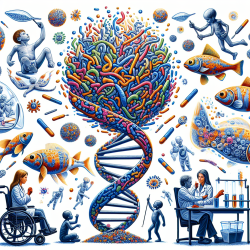Introduction
The intersection of dysglycemia and abnormal adiposity as drivers of cardiometabolic-based chronic disease is a critical area of study, particularly in the context of the Czech population. Recent research, as detailed in the article "Dysglycemia and Abnormal Adiposity Drivers of Cardiometabolic-Based Chronic Disease in the Czech Population," provides a comprehensive review of the biological, behavioral, and cultural/social determinants of health that contribute to these conditions. This blog aims to translate these findings into actionable insights for practitioners, particularly those working with children, to improve health outcomes through data-driven strategies.
Key Findings and Implications
The study highlights several determinants that practitioners should consider:
- Biological Factors: Genetic predispositions play a significant role in the prevalence of dysglycemia and abnormal adiposity. Understanding these can help tailor interventions more effectively.
- Behavioral Factors: High consumption of saturated fats, salt, and alcohol, combined with low physical activity, are prevalent in Czechia. Encouraging healthier eating habits and increased physical activity can mitigate these risks.
- Cultural/Social Determinants: Health literacy and socioeconomic status significantly impact health outcomes. Practitioners should focus on education and community engagement to improve health literacy and address disparities.
Strategies for Practitioners
Practitioners can leverage these findings to enhance their practice:
- Personalized Interventions: Use genetic and behavioral data to create personalized health plans that address specific risk factors for each child.
- Community Engagement: Develop programs that engage communities in health education, focusing on improving dietary habits and increasing physical activity.
- Health Literacy Programs: Implement educational initiatives that improve health literacy, particularly in underserved communities, to empower families in managing health effectively.
Encouraging Further Research
While the study provides a robust framework, further research is essential to explore the nuanced interactions between these determinants and their impact on child health outcomes. Practitioners are encouraged to participate in or initiate studies that further investigate these relationships, particularly in diverse populations.
Conclusion
By integrating the insights from this research into practice, practitioners can make informed, data-driven decisions that enhance health outcomes for children. The focus should be on personalized care, community engagement, and health literacy to address the multifaceted drivers of dysglycemia and abnormal adiposity.
To read the original research paper, please follow this link: Dysglycemia and Abnormal Adiposity Drivers of Cardiometabolic-Based Chronic Disease in the Czech Population: Biological, Behavioral, and Cultural/Social Determinants of Health.










